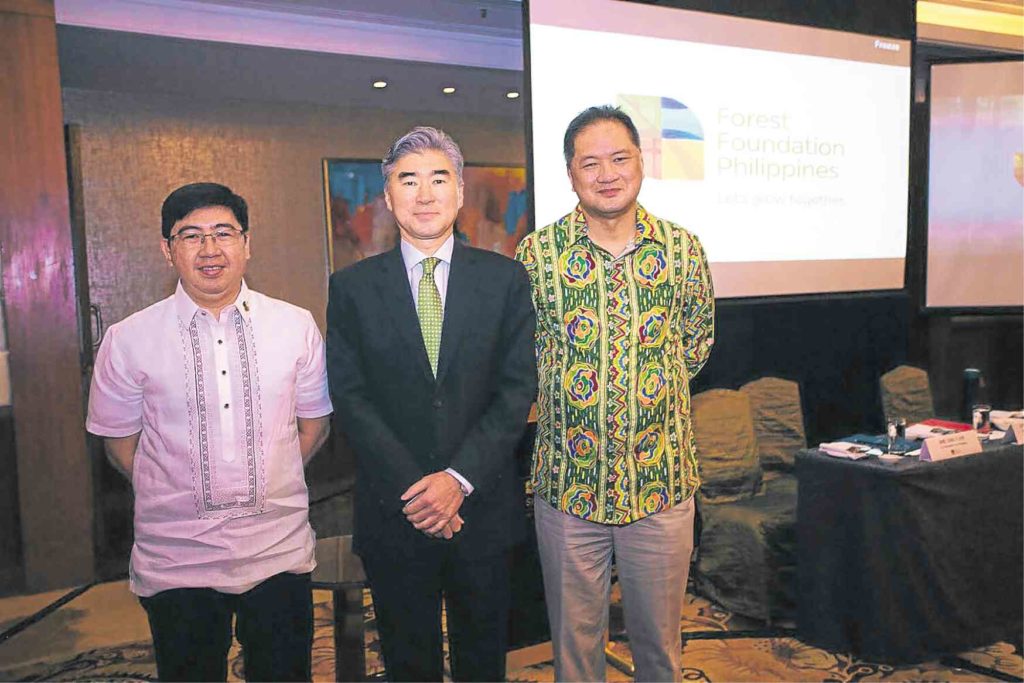Wanted: Social entrepreneurs committed to save PH forests

PARTNERS. (From left) executive director Jose Andres Canivel, US Ambassador Sung Kim, FFP chair Antonio La Viña.
Calling all Filipino social entrepreneurs, especially those whose business’ thrust is environmental protection and preservation: The Forest Foundation of the Philippines (FFP) needs you as a partner in saving one of the country’s most prized natural resources, as well as helping promote sustainable economic growth.
In a recent briefing, FFP (formerly known as the Philippine Tropical Forest Conservation Foundation), unveiled its five-year plan, starting with a “pitch fest” on July 22 dubbed “Forest Fest PH.”
The event gives entrepreneurs—both young and established—who have a passion for forest protection the opportunity to present their innovative business ideas to a panel of judges. The one deemed to have the best proposal will be awarded a P450,000 grant.
The move to tap social entrepreneurs, said FFP executive director Jose Andres Canivel, is also the organization’s way of reaching out to more millennials.
“By engaging the youth through their passion points—social entrepreneurship, ecotourism, environmental conservation, and arts and culture—we hope to shape a generation of social entrepreneurs who will champion the cause of Mother Nature above everything else,” added FFP chair Antonio La Viña.
FFP, a nonprofit organization established in 2002 under two bilateral agreements between the Philippine and US governments, has provided grants to other organizations that empower people to protect forests.
To date, FFP has supported over 450 projects involved in the improvement of 1.5 million ha of forest lands; the restoration of around 4,200 ha of forests through reintroduction of appropriate native species; and the establishment of over 40 community-conserved areas and 60 community enterprises.
“The United States has always been a staunch supporter and advocate of environmental conservation,” said US Ambassador to the Philippines Sung Kim at the briefing. “Together with partners like the Philippines, we carry the responsibility to lead the global advocacy to make the environment our number one priority.”
Also part of FFP’s 2017-2021 Program Plan is the allocation of P480 million which will serve as funding of projects that support the protection and sustainable management of four of the country’s “focal landscapes”: Sierra Madre; Palawan; Samar and Leyte; and Bukidnon and Misamis Oriental.
Three grant categories are available: small grants worth up to P500,000, for projects that must be implemented within a year and deliver expected output immediately; medium grants worth up to P6 million, for projects which must be implemented with one to three years; and large grants worth up to P24 million, for projects which must be implemented within one to five years.
Design, capacity, impact, relevance, efficiency, and sustainability are the six criteria on which the organization will base their evaluation of eligible project proposals.
Other activities are also eligible for fund support from the FFP as long as they are aimed toward achieving any of the group’s four desired outcomes: to grow forests, grow livelihoods, grow partnerships, and grow advocates.
“We’ve made progress in the protection of forests—but not enough progress… And I think we’re going to end up the same way if we don’t recast the way we engage communities and bring in young people to implement new strategies in forest protection and rehab,” said La Viña.
